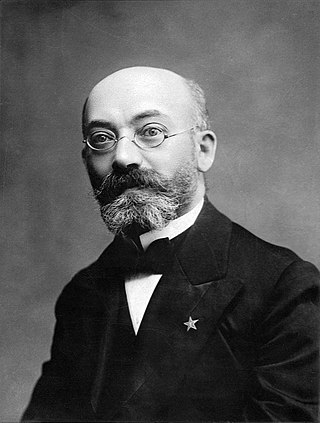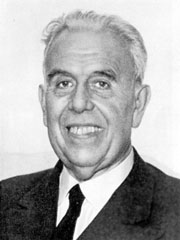
Esperanto is the world's most widely spoken constructed international auxiliary language. Created by L. L. Zamenhof in 1887,it is intended to be a universal second language for international communication,or "the international language". Zamenhof first described the language in Dr. Esperanto's International Language,which he published under the pseudonym Doktoro Esperanto. Early adopters of the language liked the name Esperanto and soon used it to describe his language. The word esperanto translates into English as "one who hopes".

L. L. Zamenhof was the creator of Esperanto,the most widely used constructed international auxiliary language.

Zamenhof Day,also called Esperanto Book Day,is celebrated on 15 December,the birthday of Esperanto creator L. L. Zamenhof. It is the most widely celebrated day in Esperanto culture. On this day,Esperantists hold information sessions and cultural gatherings to promote literature in Esperanto.

The Universal Esperanto Association,also known as the World Esperanto Association,is the largest international organization of Esperanto speakers,with 5,501 individual members in 121 countries and 9,215 through national associations in 214 countries. In addition to individual members,70 national Esperanto organizations are affiliated with UEA. Its current president is Prof. Duncan Charters. The magazine Esperanto is the main publication to inform UEA members about everything happening in the Esperanto community.
The Esperantic Studies Foundation,abbreviated ESF,is a non-profit organisation initiated in 1968 by Jonathan Pool,E. James Lieberman and Humphrey Tonkin,with the aim to further the understanding and practice of linguistic justice in a multicultural world,with a special focus on the study of interlinguistics and the role of Esperanto.

The Akademio de Esperanto is an independent body of Esperanto speakers who steward the evolution of said language by keeping it consistent with the Fundamento de Esperanto in accordance with the Declaration of Boulogne. Modeled somewhat after the Académie française and the Real Academia Española,the Akademio was proposed by L. L. Zamenhof,the creator of Esperanto,at the first World Esperanto Congress,and was founded soon thereafter under the name Lingva Komitato. This Committee had a "superior commission" called the Akademio. In 1948,within the framework of a general reorganization,the Language Committee and the Academy combined to form the Akademio de Esperanto.

Helmar Gunter Frank was a German mathematician and pedagogist. He was among the first scientists to apply mathematical methods in teaching and psychology. He established a method to measure intelligence on an absolute and homogeneous scale rather than by comparison between individuals.

Edmond Privat was a Francophone Swiss Esperantist. A historian,university professor,author,journalist and peace activist,he was a graduate of the University of Geneva and a lecturer for the World Peace Foundation. His collective works consist of original dramas,poems,stories,textbooks and books about the Esperanto movement.

Probal Dasgupta is an Indian linguist,Esperantist and activist. Dasgupta's interest in linguistics started at a very young age. He published his first article in phonology at the age of eighteen in Indian Linguistics the journal of the Linguistic Society of India His 1980 New York University PhD dissertation Questions and Relative and Complement Clauses in a Bangla Grammar is considered one of the seminal works in Bangla syntax.

Aleksandr Dmitrievich Dulichenko is a Russian-Estonian Esperantist,linguist,and an expert in Slavic microlanguages currently living in Estonia. He is a professor at the University of Tartu in Tartu,where he is the head of the department of Slavic studies.
The Center for Research and Documentation on World Language Problems (CRD) is an international research foundation created to study,document,and educate people about language problems,intercultural communication and international relations throughout the world.

Wim De Smet was a Flemish zoologist,specialized in marine mammals,and an esperantist. He published a lot of scientific and popularizing articles in Dutch,English,French and Esperanto. He projected an entirely new system for the naming and classification of animals and plants.

Grégoire Maertens is a Belgian Esperantist who was a member of the Estraro for the UEA from 1977 until 1992. From 1980 until 1986,he was president of the UEA,and an honorary member from 1993 onwards.

Mark Fettes is an Esperantist and university professor of education,and former President of the World Esperanto Association,known by its Esperanto initials as UEA.

La Esperantisto,stylised as La Esperantisto.,was the first Esperanto periodical,published from 1889 to 1895. L. L. Zamenhof started it in order to provide reading material for the then-nascent Esperanto community.

The following outline is provided as an overview of and topical guide to Esperanto:

Lena Karpunina was an Esperanto-language writer in Tajikistan. Born in what is now Russia,she grew up in the Tajik capital of Dushanbe,then was forced to leave for Germany due to the Tajikistani Civil War. From 2010 until her death,she was a member of the Akademio de Esperanto,chosen primarily in recognition of her work in the field of literature.

Ilona Koutny is a Hungarian linguist and Esperantist. She works as a professor in Poznań,Poland. In 2008,she was honoured as "Esperantist of the Year" by the magazine La Ondo de Esperanto.

Bridge of Words:Esperanto and the Dream of a Universal Language is a 2016 non-fiction book by American poet and professor Esther Schor. Concerning the history of Esperanto,the world's most widely spoken constructed language,it looks at various figures within Esperanto's history as well as Schor's own experiences with the language as an Esperantist.
















